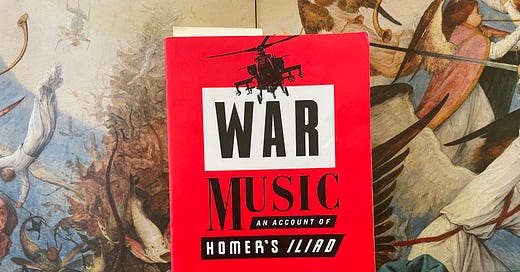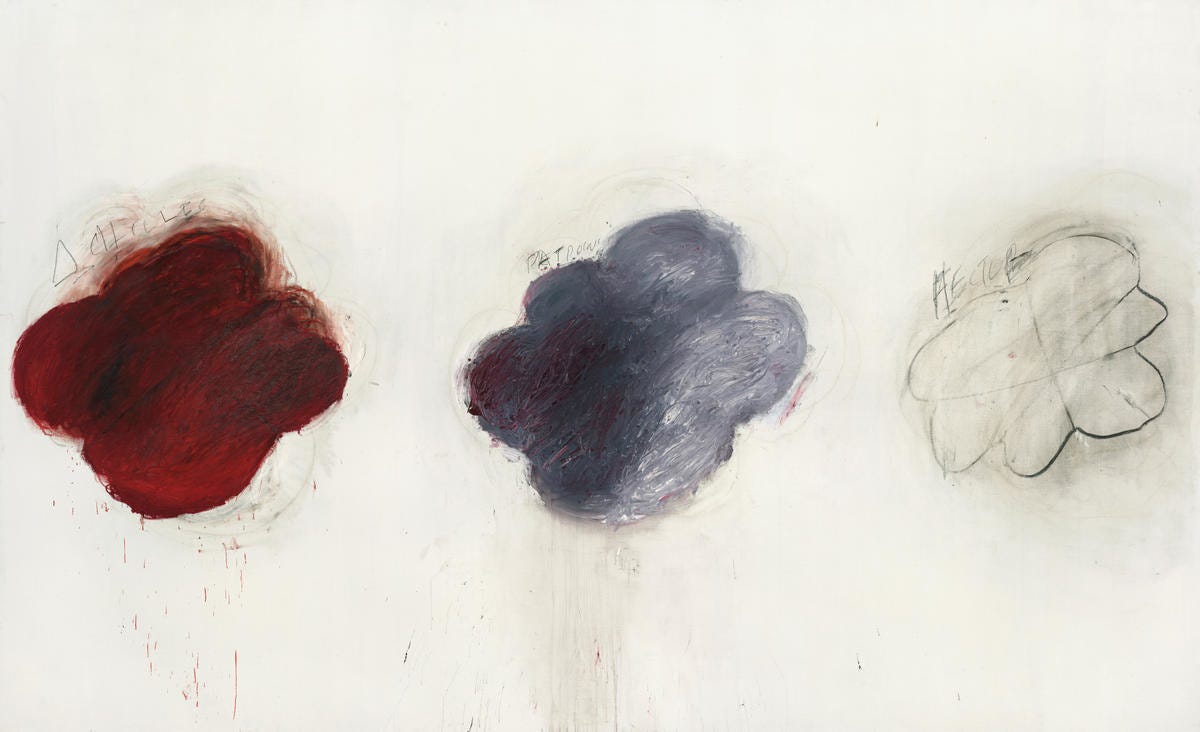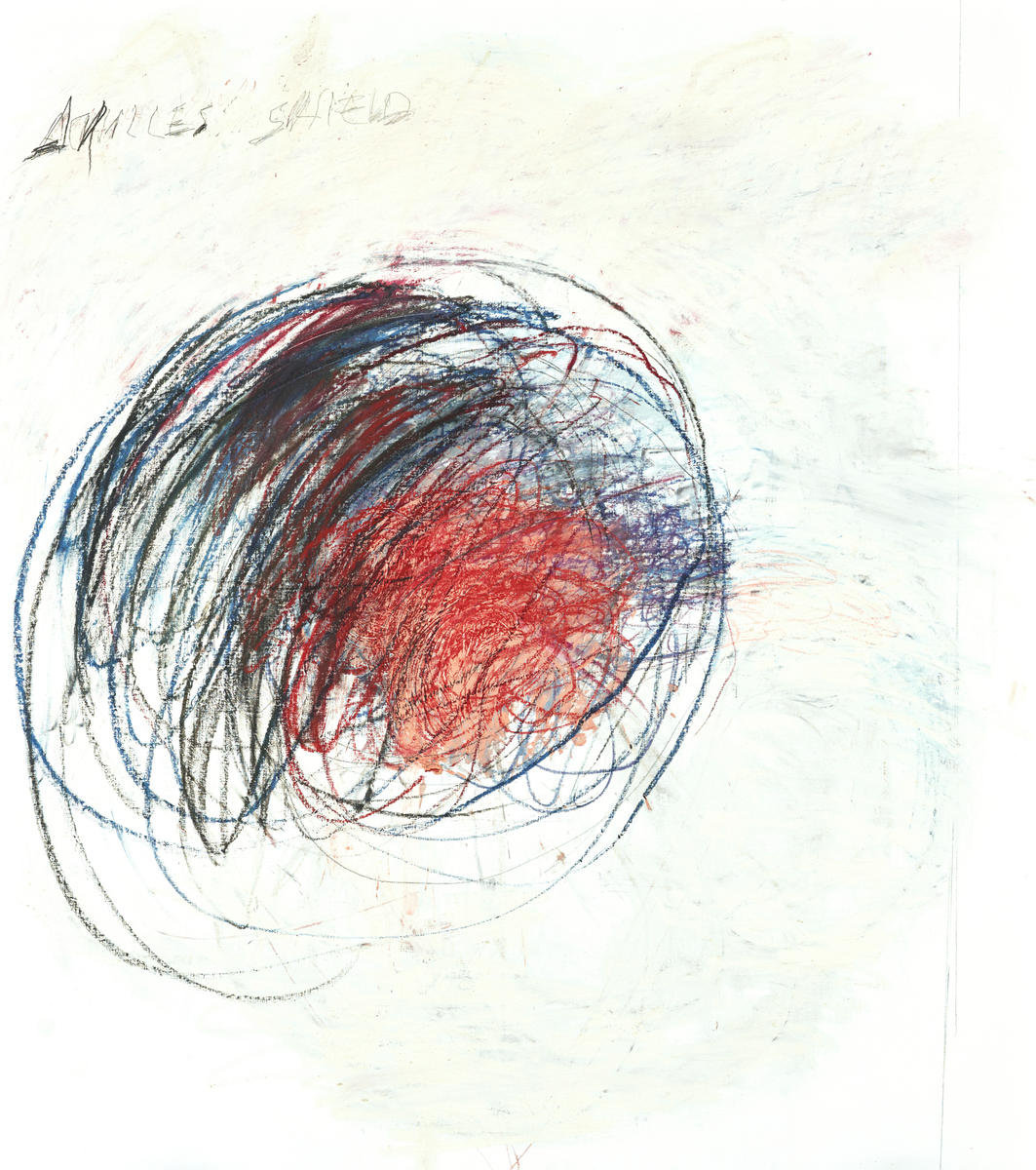If you ask me, Christopher Logue’s War Music, his “account of Homer’s Iliad” in which the epic is reconfigured as a long modernist poem, is as close as it gets to knowing what it was like to experience Shakespeare in his own time. Obviously old Will has a leg up on account of such small advantages as “creating the first modern psychological portraits of humanity” and “laying the groundwork for all subsequent English literature.” And he wrote ten or twelve masterpieces, not just one. But if you want to read an immaculately crafted tragedy that mixes registers and tones to encompass terrible beauty and low comedy alike, written in an iambic pentameter of inexorable momentum, but you want it to be written by someone who shares a consciousness with you, who lived through modernism and the World Wars, who is an admirer of Kubrick and Eisenstein as well as Homer and Ovid, who has seen the shaky footage from the invasion of Normandy and the television spectacle of the Gulf War, and wrapped it all up into the oldest war story of all, well…
Here’s a furious Achilles, addressing Agamemnon:
Heroes, behold your King -
Slow as an arrow fired feathers first
To puff another's worth,
But watchful as a cockroach of his own.
Behold his cause:
Me first, me second -
And if by chance there is a little left - me third.
Behold his deeds:
Fair ransom scanted, and its donor spurned.
The upshot - plague.
O Agamemnon, O King Great I Am,
The Greeks who follow you, who speak for you,
Who stand among the blades for you,
Prostitute loyalty.
To me, the Ilians are innocent.
They have not fleeced my father's countryside.
Cloud-shadowing mountains and abyssal seas
Separate them from Pythia.
And half the time
You Mycenaean/Trojans seem to me
Like two bald men fighting over a comb.
It’s the “fair ransom scanted and its donor spurned” that first jumped out at me there. It’s a beautiful constellation of syllables that rolls around in one’s head, like “full fathom five thy father lies.” Surely you’re not allowed to write in that straightforwardly Elizabethan mode in the twentieth century? But you are, if like Logue you avoid pastiche by treating the entire language as equally up for use, from the standard epic (“Heroes, behold your king") to the boardroom cliche (“The upshot”) to the wisecrack (“Me first, me second…”). Which is why it is Shakespeare I keep returning to when considering Logue, rather than trying to compare him with other versions of Homer. There are periods in literature when the English language itself seems infused with a wild vitality, as if it is a living being trying to break free from a long period of torpor. The century of Shakespeare, Donne, and the King James Bible was one such era. The century of Pound, Eliot, and Logue was another.1
Shakespeare and Eliot. Those are pretty heady comparisons, but I think they are merited. W.H. Auden said that though Eliot’s influence was immense, it was hard to say exactly what it was. He was absorbed so totally that he dispersed and became invisible. Logue is the rare exception. “Eliot is still the best for me and what happened after him is not as interesting, not as good,” he claimed in an interview. The Waste Land looms over War Music’s jarring shifts and range of (often hidden) allusions to the history of English prose. But instead of a dour internal journey to the red rock Logue gives us speed, action, violence, force. It marches forward relentlessly, punctuated by shouts: ‘AVE!’ ‘LORD OF LIGHT!’ ’TROY! TROY! TROY!’
Then there are the similes. How different, really, is the Homeric simile from the modernist collage? The effect of all those long digressions, all those rosy-fingered dawns, is to stretch the Iliad out so it encompasses not just Troy but the entire Greek world. All the modernists did was add time as well as space to the technique, so Eliot’s crowd flowing over London Bridge becomes Dante’s vision of hell and Logue gives us: “As many arrows on his posy shield/As microphones on politicians' stands.”
Much is made of the deliberate anachronisms in War Music because they’re an easy way to discuss where it diverges from Homer, everyone mentions a Homeric simile later in the poem that asks you to imagine “the Uzi shuddering against your hip.” But anyone can write an adaptation of a classic that incorporates modern language and concepts (to often disastrous results; see the cringey recent “The Old English were the first rappers” version of Beowulf). What Logue does is use anachronism for strange disjunctions and shocks of recognition.
This is where I think he actually has a leg up on the original. Take the scenes between the gods. In Homer the gods are basically like the humans, only bigger. In fact, the humans in the Iliad, being mortal, have an essential nobility and tragedy impossible to find in the often tedious, simpering, soap opera scenes on Mount Olympus. Logue fixes this by playing up the comedy of the gods, but also by placing them out of time, contrasting with the remote Bronze Age warrior cultures of the Greeks and Trojans. Thus the gods are made to seem more like the immortal beings they are, because, existing in a different literary lifeworld, they are possessed of our perspective on not just the warriors but everything that came after them. They are, in some sense, reading the poem with us.
Here’s what I mean. Following a gloriously archaic scene of tribute and sacrifice among the Trojans, we are suddenly flung into a positively Wildean dialogue between Zeus and Poseidon:
Poseidon surfaces.
'Good morning.'
'And to you.'A pause. And then:
'Could I have Your opinion of the wall?'
'The wall?'
'The new, Greek wall'
'You mean their palisade.'
'I mean their wall.'
'They have begun a palisade, but not a wall.
Walls, as you know, are made of stone,' God said,
As He resumed His steps.
'And as you know,' his brother said (wading along),
We split the world in two.
You got the sky. I got the sea. And the earth -
Especially what the humans call the shore -
Was common ground. Correct?'
'Correct.'
'Then why is Greece allowed to build a wall
Across my favourite bay with nothing said?
Did I hear aves? No. Paeans? Not one.
Pfwah... do what you like with Lord Poseidon's honey sand,
No need to sacrifice a shrimp to him.
Just up she goes! Renowned as far as light can see!
The god - some seaside lizard sneezing in the weed.
His dignity - a rag. A common rag:Hardly are those words out, when:
'Rubbish!'
They hear, and looking round they see
(Steadying her red-sepal hat with the russet-silk flutes)
Creamy-armed Hera with teenaged Athene
(Holding their scallop-edged parasol high)
As they wobble their way down the dunes
In less comic scenes Logue effectively communicates the gods’ otherworldly power, as in the stunning sequence where Aphrodite appears to the armies in a cloud of doves:
…in oyster silk,
Running her tongue around her strawberry lips
While repositioning a spaghetti shoulder-strap,
But you can tell that, like Homer, he regards their lofty pettiness with a bit of contempt.
Who was Christopher Logue? A troublemaker and kleptomaniac, he joined the army at seventeen and was sent to Palestine as the Empire slipped away, where he was promptly court-martialed for petty fraud and spent a year in a medieval prison, reading and writing. Upon his return he bounced around as a minor wit in Paris, where he wrote pseudonymous pornography for Olympia Press, and in London, where he became a committed pacifist and marched for nuclear disarmament with Bertrand Russell. In 1959 he was asked by the classicist Donald Carne-Ross to adapt a section of the Iliad for a BBC broadcast. His mind stayed for the rest of his life on the windy plains of Troy, composing his masterpiece.
He died in 2011, having adapted around half of the Iliad. He got as far as Achilles roused to return to war, marching off to inflict mass death upon the Trojan army. He left us with this final image: “Someone has left a spear stuck in the sand.”
Not coincidentally, both the Elizabethan poets and the modernists were obsessed with antiquity. The Victorians, with their dark satanic mills and their rain, steam, and speed, seem fusty to us now while Donne and Shakespeare remain somehow immediate. Though it should be said that when the English language is tamed it can be better harnessed into service creating characters, landscapes, minutely realized societies, as in the Victorian novel. I suspect the 21st century, with our world-shaking new social technologies and our attitude of haughty disdain towards the unenlightened past, will come to be seen similarly to the 19th.






Fantastic post. Really gets at what makes Logue so good. I was very into him at one point, years ago, and even tried to write something Logue-inspired, but for Campanella's City of the Sun (you can imagine how well that worked, ha ha). This makes me want to revisit him.
Great analysis. Contemporary (well, close enough) poetry is a real blind spot of mine, but Logue seems fascinating, I’ll be checking this out!